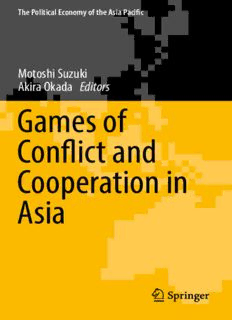
Games of Conflict and Cooperation in Asia PDF
Preview Games of Conflict and Cooperation in Asia
The Political Economy of the Asia Pacific Motoshi Suzuki Akira Okada Editors Games of Conflict and Cooperation in Asia The Political Economy of the Asia Pacific Serieseditor VinodK.Aggarwal Moreinformationaboutthisseriesathttp://www.springer.com/series/7840 Motoshi Suzuki • Akira Okada Editors Games of Conflict and Cooperation in Asia 123 Editors MotoshiSuzuki AkiraOkada GraduateSchoolofLaw KIER,KyotoUniversity KyotoUniversity Kyoto,Japan Kyoto,Japan ISSN1866-6507 ISSN1866-6515 (electronic) ThePoliticalEconomyoftheAsiaPacific ISBN978-4-431-56464-5 ISBN978-4-431-56466-9 (eBook) DOI10.1007/978-4-431-56466-9 LibraryofCongressControlNumber:2016963797 ©SpringerJapanKK2017 Thisworkissubjecttocopyright.AllrightsarereservedbythePublisher,whetherthewholeorpartof thematerialisconcerned,specificallytherightsoftranslation,reprinting,reuseofillustrations,recitation, broadcasting,reproductiononmicrofilmsorinanyotherphysicalway,andtransmissionorinformation storageandretrieval,electronicadaptation,computersoftware,orbysimilarordissimilarmethodology nowknownorhereafterdeveloped. Theuseofgeneraldescriptivenames,registerednames,trademarks,servicemarks,etc.inthispublication doesnotimply,evenintheabsenceofaspecificstatement,thatsuchnamesareexemptfromtherelevant protectivelawsandregulationsandthereforefreeforgeneraluse. Thepublisher,theauthorsandtheeditorsaresafetoassumethattheadviceandinformationinthisbook arebelievedtobetrueandaccurateatthedateofpublication.Neitherthepublishernortheauthorsor theeditorsgiveawarranty,expressorimplied,withrespecttothematerialcontainedhereinorforany errorsoromissionsthatmayhavebeenmade. Printedonacid-freepaper ThisSpringerimprintispublishedbySpringerNature TheregisteredcompanyisSpringerJapanKK Theregistered companyaddressis:ChiyodaFirstBldg.East,3-8-1Nishi-Kanda,Chiyoda-ku, Tokyo 101-0065,Japan Preface Internationalrelationsin Asia aremultifaceted.Conflictcoexistswith cooperation acrossvariousissuerealms.Ontheonehand,intherealmofsecurity,NorthKorea hasbeenconductingtestsofnuclearweaponsandmedium–andlong-rangemissiles relentlesslyinspiteofoppositionfrommanyAsianandnon-Asianstates.Territorial disputes are intensifying between China and neighboring states over islets in the South and East China Seas to the extent that, under a high level of uncertainty, a small miscalculation could precipitate the outbreak of armed conflict. To counter North Korea or China or both, Japan, South Korea, and Taiwan are strengthening security ties with the United States. In contrast, the North Korean and Chinese moves, which appear provocative to many, might be strategic responses to the improvedsecuritytieswiththeexternalgreatpowerthattheyfindinimicaltotheir ownsecurityinterests. On the other hand, both the depth and width of regional cooperation have beenexpandingsteadily.In the security field, internalwars in Cambodiaand East TimorhavebeensettledthroughUNpeacekeepingoperationstowhichbothAsian and non-Asian states have contributed. In currency matters, the swap agreements between central banks, which began in 2000 at the bilateral level, have expanded and become multilateral. In the area of finance, China has established the Asian InfrastructureInvestment Bank (AIIB) to satisfy strong demand for infrastructure development in a growing Asia, with participation by 56 states. In trade matters, bilateralandsubregionalfreetradeagreementshavebeenconcludedbetweenAsian states and between states inside and outside the region. In general, a multilateral cooperation effort, found in these instances, faces a collective action problem, thusnecessitatingcreativeinstitutionalarrangementstosolvetheproblemandtake effect. The abovementioned outcomes indicate that Asian states have been using various arrangements skillfully to facilitate cooperation. Yet this does not mean that Asian states are always successful in attaining regional cooperation. Indeed, there are many other occasions in which cooperative efforts have failed due to informationalorinstitutionaldefectswiththecontinuationofinterstateconflictand theimpairmentofstates’securityandprosperity. v vi Preface Beneaththeblendofconflictandcooperation,weperceivegoal-orientedbehav- ior, which seeks to maximize a state’s preference for security, prosperity, or even domination. A state’s goal-oriented behavior often takes place in reaction to another state’s similar behavior on an ex ante or ex post basis under various informational and institutional constraints. The state’s goals may or may not be realized, depending on constraints and strategic complexity. Hence, from an analyst’svantagepoint,ittakesanappropriateresearchmethodtoexplainorpredict internationaloutcomesthatcannotbeinferreddirectlyfromstates’goals. Toilluminatethestrategicinteractionsofgoal-orientedbehaviorandtheconse- quences, we employ game theory as our research method. In this volume, we try to show that Asian states play games of conflict and cooperation strategically by creating,changing,ordestroyinginstitutionsin theissue realmsofsecurity,trade, and currency. As noted by Robert Keohane, conflict or discord is a precursor to cooperation.Thecreationofappropriateinstitutionsthatcoordinatestates’actions can turn present conflict into future stable cooperation. Therefore, conflict and cooperation are inseparable phenomena and are integral parts of states’ strategic interactionsunderconstraints. We believe that instrumental rationality is a principal behavioral guide for humanity and that there exists no discernible difference in the extent of instru- mentalrationality between the East and the West. Despite our commitmentto the assumption of instrumentalrationality, we do not disregardhistory and culture as determinants of international outcomes. Rather, we see history and culture either as influencing states’ preferences and beliefs or as constituting social institutions toconstrainstates’behaviorandstrategicinteractions.Accordingly,ifasignificant differenceisfoundbetweentheEastandtheWestinthequalityofregionalrelations, wewillarguethataprimarysourceofthedifferencerestsuponvariationsbetween regions or even within a region in the institutions that are influenced by history and culture. Historical and cultural variations divide contemporary Asia, making regionalinstitutionalcooperationdifficult,thuspromptingsomeAsianstatestouse globalorinterregionalarrangementsinordertoobtainthebenefitsofcooperation. Asaresult,Asiahasincreasinglybeenanopenorporousregion. Qualifications are providedfor this line of argumentin the first chapter, which also discusses the affinity of international relations theory and game theory with special attention to Japan and Asia. The following ten substantive chapters are developedbasedontheconceptualframeworkand,forintegrityandcoherence,are subgroupedintofourpartsthatcorrespondtomajorissuesininternationalrelations scholarship:(1)conflictmanagement,(2)armscontrol,(3)trade,and(4)currency. Effectiveinstitutionsinthefourrealmsarecrucialtoastableinternationalorder.In fact,suchinstitutionswerefoundinthemedievalChina-centricorderaswellasin thepost-WorldWarIIUS-ledorder.Eachsubstantivechapteranalyzesthenatureof conflictandcooperationinapost-hegemonicerawheninstitutionsareindecay. Thiseditedvolume,GamesofConflictandCooperationinAsia,isanoutcome ofatrulycollaborativeworkbyaresearchteamofJapanesescholarswhospecialize in game theory, international economics, international security, or international politicaleconomy.ThisEnglish volumehas vastly expandedand improvedonthe Preface vii Japaneseversion,titledKokusaiFunsotoKyochonoGeimu(GamesofInternational Conflict and Cooperation),published in 2013 by Yuhikaku,a superb publisher of academicbooksbasedinTokyo.Throughsubstantialrecalibrations,revisions,and the addition of new chapters (1, 2, 3, and 10), the English version has become completely different from the earlier Japanese version. Furthermore, we have conductedmutualblindreviewstoguaranteethequalityofeachchapter. OurresearchteamhasheldbiannualworkshopsatKyotoUniversityeveryMarch and at Kobe University every September since 2008. The workshops have been extraordinarilyproductiveandenjoyablebecauseoftheteammembers’profession- alismandhumor.We aregratefultoAtsushiIshida(theUniversityofTokyo)who hadcontributedhischaptertotheJapaneseversionbutwhoseadministrativeduties preventedhim from doingthe same for the English version.Our special gratitude goes to Emeritus Professor Yoshinobu Yamamoto (the University of Tokyo) for his constructive comments in several workshop meetings and Professor Vinod Aggarwal(UniversityofCaliforniaatBerkeley)forallowingourvolumetobepart oftheSpringerPoliticalEconomyoftheAsiaPacificseriesunderhiseditorialaegis. M. Suzuki is also indebted to T.J. Pempel (University of California at Berkeley) andBillGrimes(BostonUniversity),whovisitedKyototoprovidetheirinsightful analyses of Asian politics and international political economy. We acknowledge the Japan Society for the Promotionof Science (JSPS) for the grants(#23330053 and#26245020)thatmadeourresearchpossible.Lastbutnotleast,wethankJuno Kawakami,aneditorinSpringer’sTokyoofficewhopatientlywaitedforourbelated bookmanuscriptsduringtheeditorialprocessandgavebirthtohersecondchildat the time leading up to publication. Our book is dedicated to young scholars and studentscommittedtosystematicanalysesofinternationalrelationsinAsia. Kyoto,Japan MotoshiSuzuki September1,2016 AkiraOkada Contents 1 A Rational Approachto the Study of International RelationsinAsia............................................................ 1 MotoshiSuzuki PartI SecurityCooperationandConflictManagement 2 Signaling Game of Collective Self-Defense intheU.S.-JapanAlliance ................................................. 31 ShuheiKurizaki 3 Information Sharing in Early Stage International Disputes:HowChinaandJapanCommunicate ........................ 57 ShokoKohama,AtsushiTago,andKazunoriInamasu 4 PeacekeepingbytheUN andRegionalOrganizations: SharingtheBurdenorPassingtheBuck?............................... 83 YukariIwanami PartII SecurityCooperationandArmsControl 5 Politics Over the Claim of Individual Self-Defense atWars:AidConditionalityandReciprocityinAsian RegionalConflict ........................................................... 117 AtsushiTAGO 6 InternationalCooperationandInstitutionFormation: AGameTheoreticPerspective............................................ 137 AkiraOkada 7 AnAgenda-SettingGameoftheLandmineBanTreaty................ 159 HikaruHayashi ix x Contents PartIII TradeCooperation 8 FTA/EPA Negotiations and Domestic Reforms inTwo-LevelGamesAnalysis............................................. 183 KaoruIshiguro 9 TheParadoxofCompliance:DoesLegalizationIncrease ComplianceinTradeDisputes?........................................... 207 KeisukeIida PartIV CurrencyCooperation 10 AnalyzingInternationalDevelopmentalLoanMarkets withRivalLenders ......................................................... 227 MotoshiSuzuki,KeisukeIida,andShoheiDoi 11 GlobalismandRegionalism:TheEastAsianCurrency CrisisandInstitutionalBuilding.......................................... 249 MotoshiSuzuki Index............................................................................... 271
Description: